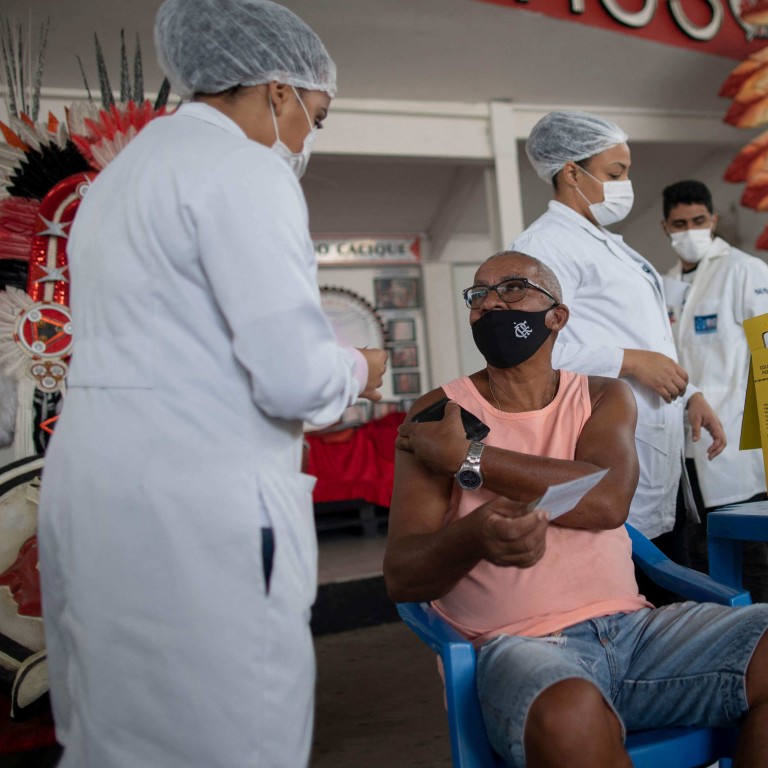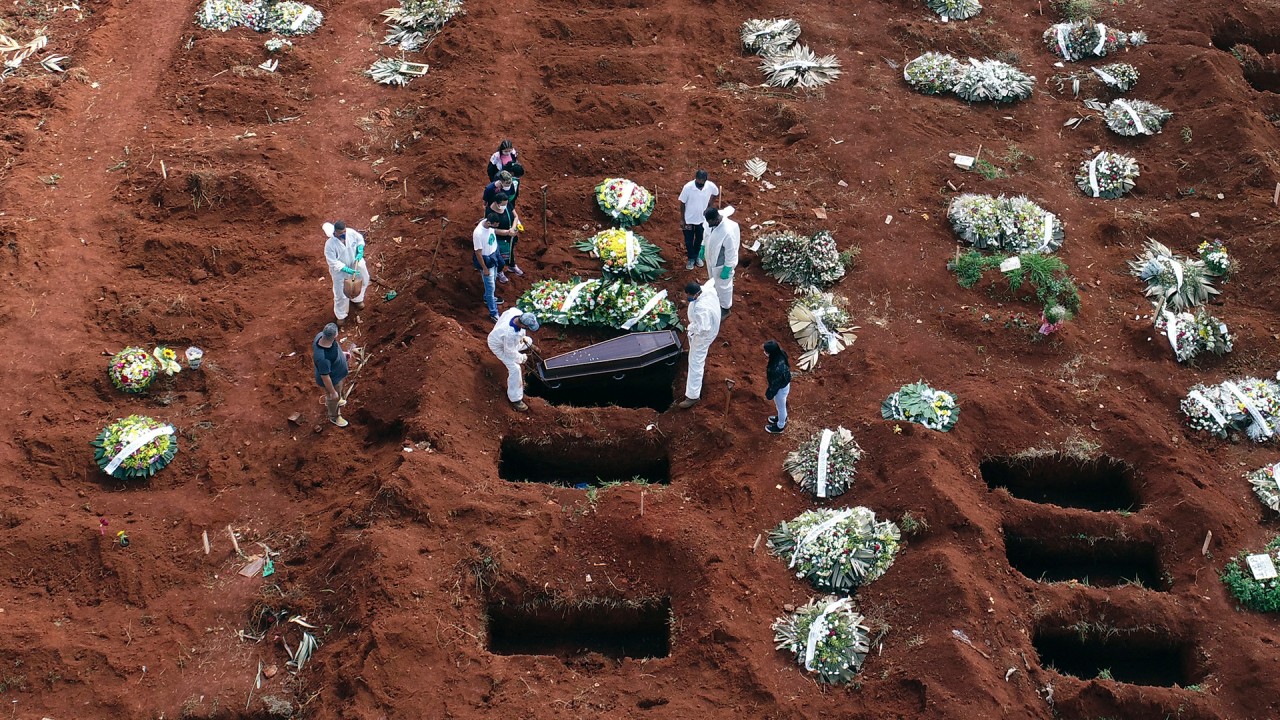
China vaccines put to real-world test against Covid-19
- Studies of vaccinated populations in Chile and Brazil show Sinovac can reduce deaths, counter variants
- Efficacy rates are lower than mRNA shots but experts say that means more people will need to receive vaccinations to achieve herd immunity
The first large-scale, real-world study of the Sinovac Biotech inactivated vaccine – developed using the virus with its disease-producing capacity removed – found that, while it falls short of the effectiveness of vaccines using cutting edge mRNA technology, it significantly reduces deaths and symptomatic cases.
Jerome Kim, director general of the International Vaccine Institute in Seoul, said clinical trials were limited to measuring how well a vaccine worked in an individual but could not examine its ability to stem the disease’s spread at a population level, where more factors were at play. Tracking real world data on a new vaccine “gets to a question of effectiveness … does it work in countries that have achieved certain levels of protection?” he said.
Answering these questions takes time, but a study of 10.5 million people in Chile found the Sinovac vaccine was 67 per cent effective in preventing symptomatic Covid-19, and 80 per cent effective in preventing deaths – meaning that 100 fatal cases of the disease would have been reduced to just 20 if everyone was vaccinated. The researchers also found the vaccine was around 85 per cent effective at preventing hospitalisations.
The results were not far off those from a phase 3 clinical trial in Brazil, which found the vaccine was around 50 per cent effective and returned a similar figure to Chile’s real-world study for the prevention of moderate and severe cases of the disease. In contrast, a Turkish clinical trial found an 83.5 per cent rate of effectiveness, a result which could underline the importance of local circumstances.
Researchers in Chile said their findings meant wide vaccine coverage was needed, and health officials urged the public to get their shots. “As we don’t have 100 per cent effective vaccines it is key for all of us to be vaccinated,” Rafael Araos, adviser to the sub-secretary of public health, said on Friday.
Close to 60 per cent of Israel’s population has been fully vaccinated, according to Johns Hopkins University, and daily cases have plummeted from a high of more than 11,000 in January to fewer than 200, an effect thought to be linked in part to vaccinations.
Experts said it was likely to be too soon to see similar effects in Chile, where just over 25 per cent of its 19 million people have been fully vaccinated. Instead, the country is in the midst of a Covid-19 wave to rival its earlier peak in last year’s South American winter in terms of cases, but deaths are lower.
Comparing even gold-standard efficacy data from clinical trials of the different vaccines is difficult, because of the variations in locations and when they were conducted. But countries relying on those which have proved less effective may have to vaccinate more people to slow the spread of the disease.
Explainer | How the coronavirus vaccines compare and who can get them
“Herd immunity for Covid-19 requires around 70 per cent population immunity, either from natural infections or vaccinations or a combination of the two,” said epidemiologist Ben Cowling from the University of Hong Kong.
“Locations relying on Sinovac vaccine for control of Covid will probably be aiming to vaccinate almost everybody, so that everybody can benefit from direct protection from vaccination,” he said, pointing to the trial and efficacy results from South America.
Other countries using Sinovac include populous nations like the Philippines, Turkey, Indonesia and Brazil.
Two vaccines expected to headline the World Health Organization’s equitable vaccination programme are the single-dose shot from Johnson and Johnson, which has been shown to be 66 per cent effective in preventing moderate to severe disease globally, and AstraZeneca, which is 76 per cent effective overall. They do not require the complex and expensive logistics of the mRNA vaccines, which have so far shown the highest efficacy rates and are in high demand.
Whichever vaccines are used, their overall impact on a population can vary widely depending on the situation in each country. “There are lots of factors at play [including] how efficacious is that vaccine against the strains that are circulating and how prevalent is the virus in your community,” said immunologist and associate professor Joanna Kirman of the University of Otago.
The most pressing issue is the effect on overwhelmed hospitals and the number of fatalities. Even with infections in the country as a whole on the rise, Chilean researchers last week said divergent trends in the hospitalisation, deaths and cases in the earliest vaccinated groups suggested the vaccine was having a positive effect.
Scientists in Turkey and Brazil, where the Sinovac vaccine is also being rolled out, have observed similar effects, which could be the early signs that it is working.
A public health official in the United Arab Emirates, where another inactivated vaccine from China’s state-owned Sinopharm is being rolled out, said there had been a “significant decrease” in hospital admissions in Abu Dhabi, according to English-language newspaper The National. So far, no analyses have been released on the vaccine, which was reported to be 86 per cent effective in UAE and 79 per cent effective overall.
British coronavirus variant may have come from dogs, researchers say
But as long as the virus spreads, mutated variants will continue to emerge, which could jeopardise vaccine efficacy, according to experts. In South Africa, where a variant with a worrisome mutation – known as E484K – is spreading, clinical trials showed the AstraZeneca vaccine did not prevent mild to moderate infections there. The mutation is thought to affect how the body’s antibodies bind to the virus.
Sinopharm last month said its doses provoked a “good” neutralising effect against the strain from South Africa, while Sinovac said the effect of antibodies induced by its vaccine declined against the variant, but lab trials can only go so far.
A real-world study in Brazil has sought to understand the Sinovac vaccine’s effectiveness against a Covid-19 variant. A group of US and Brazilian scientists measured its efficacy among health care workers who caught the disease in the northwestern city of Manaus, where another variant – which also contains E484K – is prevalent.
They found at least one dose of the two-dose vaccine was 49.6 per cent effective. The real-world calculations, not yet peer-reviewed, land very close to the results of the phase 3 clinical trial in the country. More people would need to be included to give greater statistical confidence in the result, according to vaccinologist Nikolai Petrovsky of Flinders University in Australia, who was not involved in the study.
How China took an unlikely lead in the global supply of Covid-19 vaccines
Vaccine makers and scientists, including those from China, are already researching booster shots to counter variants of the virus, and other ways to improve the immune response, including mixing different doses into one regime or adding an additional shot.
Immunologist Ashley St. John, of Duke-NUS Medical School in Singapore, said it was important to review the science behind how the vaccines were designed and administered to see if efficacy against variants could be improved, if needed. In the meantime, she said, it was important to focus on what was known about the ability of the vaccines to reduce severe disease and death.
“The demand for vaccines is so high right now that any vaccines that can protect are very valuable,” she said.



